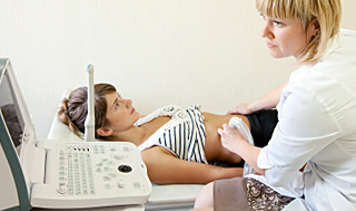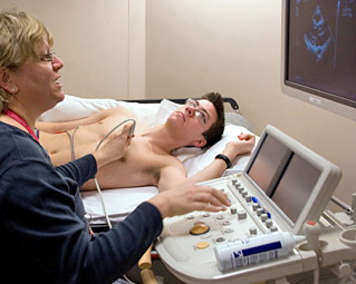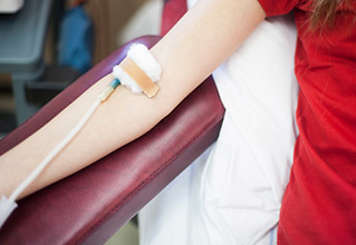Your transplant team will do a number of tests to make sure that you are ready for a transplant and that a transplant is the right option for you.
Most of these tests do not hurt. But if you find some of the tests uncomfortable or painful, you can check our suggestions for coping with painful procedures. If you’d like support or help with preparing for any of these tests, please talk to your transplant nurse. They can arrange for the child life specialist to meet with you.
Take a look at the information below to find out more about the tests you will have during your assessment.
Essential tests during a liver transplant assessment
Blood tests
Blood tests give us information about your liver and kidneys, what you are vaccinated against and what infections you may have been exposed to. We test all teens for HIV (the virus that causes AIDS) during the transplant assessment.

Ultrasound and Doppler
An ultrasound scan is a test that uses sound waves to take pictures of what is inside your body. These pictures show the size, shape and texture of your liver, gallbladder, kidneys and bladder.
Another part of the exam, the Doppler, will look at the blood vessels around your liver to make sure they are healthy and working well.
Electrocardiogram (ECG)
An ECG measures the electrical activity of your heart (such as the strength of your heartbeat) on a graph. The test tells your doctor about:
- your heart rate (heartbeat)
- if your heartbeat is regular or not
- the size of the heart muscle.
The test takes about 10 minutes. It involves putting 13 small sticky discs on your legs, arms and chest and connecting them to a machine.
Echocardiogram

An echocardiogram is like an ultrasound, but it uses sound waves (also known as sonograms) to take pictures of the size, shape and texture of your heart and how the blood flows through it. This important test gives information about the health of your heart.
The test will take anything from 30 to 90 minutes. It is not uncomfortable, but you will have to lie still while it is being done and you will feel the pressure of the wand on your chest as it takes pictures.
Echocardiogram bubble study
This test is usually given only if you are receiving a lung and liver transplant. It is the same as a regular echocardiogram except that you will receive a “contrast medium” (something that looks different than your blood) to give a better picture of your heart. The contrast medium is usually a mix of saline (sterile salt water) and a gas, such as carbon dioxide, and is given to you through an IV (intravenous line) before the test.
The study gets its name from the bubbles that form when carbon dioxide mixes with the saline. Your healthcare team will follow the path the bubbles take through your bloodstream to see if there any heart or lung problems. The bubble study is completely safe; your bloodstream will easily absorb the saline solution soon after the test.
If you need this test, your healthcare team will explain it to you in detail. If your healthcare team is worried about your oxygen levels, because of any lung conditions, they may connect you to an IV during the test.
Glomerular filtration rate (GFR)
A GFR is a test that checks the kidneys’ ability to filter toxins. It involves receiving an injection of an isotope or tracer (a tiny amount of radioactive medicine) and then having pictures taken of your kidneys.
You will be connected to an IV at first to allow the isotope or tracer to be injected and then return to have the kidneys scanned. Blood samples will also be taken at different times. A GFR can take up to three hours from when you are first connected to an IV until your final blood test.
Chest x-ray
This is an x-ray that outlines the bones and organs in your chest. It also can show any changes in your lungs, for example if you have an infection.
Possible further liver transplant assessment tests
Depending on your health and diagnosis, you may need to do other tests or meet other doctors. Your transplant nurse will discuss with you the reasons for any additional tests or appointments.
Other important tests or treatments during your liver transplant assessment

Immunizations (vaccines or “shots”)
It is very important to be fully
immunized before you have your transplant.
If you have not already given your immunization card to your transplant nurse or co-ordinator, make sure you bring it with you to your assessment. Your transplant nurse or co-ordinator will use the record to tell you if you need any other immunizations.
It is usually best to be as well protected as possible from as many viruses and bacteria before you have your transplant. After transplant, you will be unable to receive some vaccines and other vaccines might not work as well.
TB testing
In addition to vaccines, you will also need to have a TB skin test. This test checks to see if you have been in contact with tuberculosis. You will notice an area on your immunization card for tuberculosis (TB) skin tests.






